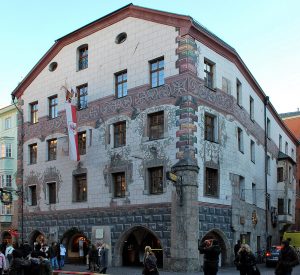5.10 Ein typischer Tag

Guten Tag!
Zum Aufwärmen machen wir unseren Tagesminiplausch und eine Wiederholung.
Wiederholung
In the previous lesson, you learned how to express the things you must do each day and to say whether you have to work during school or not. Let’s review what you have learned.
Was musst du heute machen? In your written journal, write down your must-do’s for today. Musst du heute arbeiten? Answer that question as well. Aim for complete sentences.
Lektionsüberblick
We have talked about the order of events without explicitly introducing words that help to show order (e.g, first, next, etc.). These little words help with clarity and storytelling. In the end, you will be able to 1) talk about sequenced events, 2) talk about your Monday routine in sequence, and 3) compare choice, obligations, and sequence on your typical Monday vs. Saturday.
Was weißt du schon?
Let’s do our skills check. Read the text and answer the questions that follow.
| Noch nicht start klar?
Du kannst immer auf die gleiche 1010-Lektion zurückgreifen! |
Not confident about starting this lesson?
You can always review the same Lektion from 1010. |
1) Sequence of events
Read the sentences below paying attention to the words that tell order. Then answer the questions that follow.
Kleiner Hinweis
The German idiomatic expression — “Morgenstund’ hat Gold im Mund” — literally means “the morning hour has gold in its mouth” but figuratively means “The early bird catches the worm.”
🎥 For fun, check out this video (and transcript) in which Adan is asked if he is a Morgenmensch or a Nachtmensch. See if you can tell what a Morgenmensch is!
Jetzt bist du dran!
2) Mein typischer Montag
Read and listen as Volker describes his typical Monday. Pay attention to the words that provide order to each activity. Is your Monday similar to his? Complete the activity below and practice reading the passage aloud.

|
|
Jetzt bist du dran!
3) Der Vergleich
Read the comic below for fun.
 |
 |
Indeed, school days and weekend days can be quite different! Let’s use some of the words we have learned to make some comparisons between the two. You might have noticed the word spät in the comic above. A useful word that uses spät as its base, is the word später – later. They even rhyme!
Was ist gleich? (What is the same?) Was ist anders? (What is the different?) Read the sentences below. Can you tell the difference between the student’s Monday and Saturday schedule? Some key words have been bolded in some sentences to help with meaning.

|
Am Montag muss ich um 7hr aufstehen, aber am Samstag kann ich ausschlafen und später aufstehen. Am Montag frühstücke ich um 8hr, aber am Samstag kann ich später um 12hr frühstücken. Am Montag muss ich um 8:30 an die Uni gehen, aber am Samstag kann ich zu Hause bleiben. Am Montag und am Samstag lerne ich nachmittags in der Bibliothek. Am Montag esse ich um 19:30 zu Abend, aber am Samstag esse ich um 20hr zu Abend. |
Let’s practice.
Jetzt bist du dran!
Wie sieht dein Montag aus? Wie sieht dein Samstag aus? Was ist gleich? Was ist anders? Answer the question in your written journal, thinking about at least two major differences in your Monday schedule compared to your Saturday schedule and using the sentences above as models. Be sure to incorporate the word aber (but) to show contrast and und (and) to show similarity.
Innsbruck im Blickpunkt
 Der Goldener Adler im Herzen von Innsbruck ist eines der ältesten Gasthäuser Europas und stammt aus dem Jahr 1390!
Der Goldener Adler im Herzen von Innsbruck ist eines der ältesten Gasthäuser Europas und stammt aus dem Jahr 1390!  Im Laufe der Jahrhunderte übernachteten Kaiser (Karl V. und Joseph II.), Könige (Ludwig I., Wilhelm I.), Herzöginnen (Amalia von Sachsen-Weimar-Eisenach), Dichter (Heinrich Heine), Komponisten (Wolfgang Mozart) und Schriftsteller (Johann Wolfgang von Goethe) dort.
Im Laufe der Jahrhunderte übernachteten Kaiser (Karl V. und Joseph II.), Könige (Ludwig I., Wilhelm I.), Herzöginnen (Amalia von Sachsen-Weimar-Eisenach), Dichter (Heinrich Heine), Komponisten (Wolfgang Mozart) und Schriftsteller (Johann Wolfgang von Goethe) dort.
The Goldener Adler (= the golden eagle), in the heart of Innsbruck, is one of the oldest guest houses in Europe and dates back to 1390! Over the centuries, the hotel has hosted emperors, kings, duchesses, poets, composers, and writers, including Johann Wolfgang von Goethe.
Zum Schluß

*As you conclude this lesson, don’t forget to check Canvas!*

Media Attributions
- Sind Sie ein Morgenmensch? video adapted from Deutsch im Blick, licensed under CC BY 4.0 International License.
Media Attributions
- “Samstag” Comic by German 101 Copyright © 2022 by Rebecca Linam, licensed under a Creative Commons Attribution 4.0 International License
- Photo of friends studying by pexels-cottonbro-4778635
- Private:

